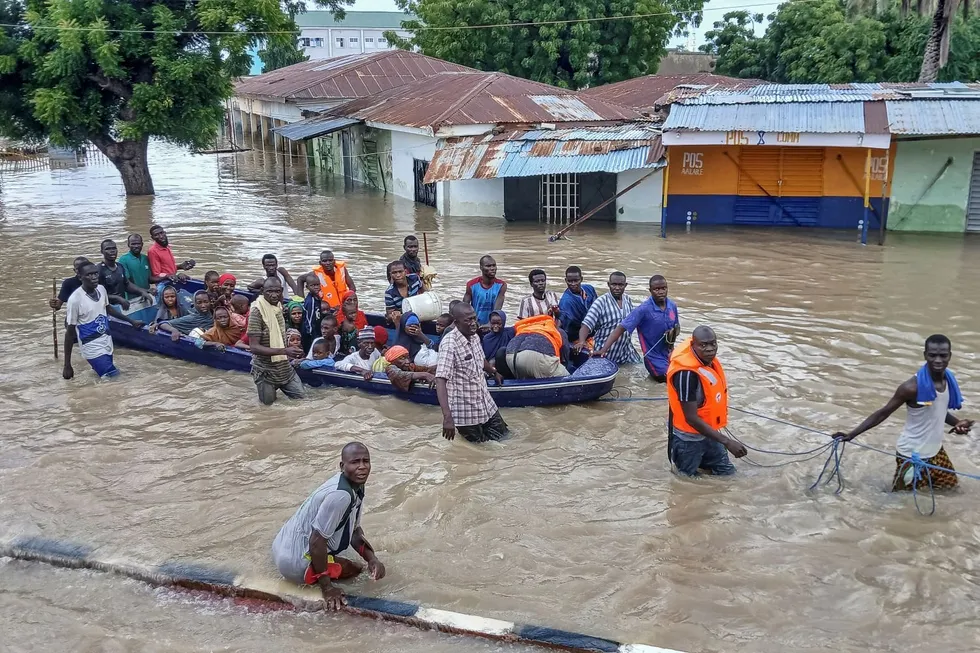By Isaac Atunlute
When heavy floods washed away bridges and displaced families in the Mokwa local government area in Niger State, the feeling of loss was palpable. In Nigeria, government aid for flood victims is often slow.
That’s why a recent crowdfunding by Nigerian banks totalling over ₦500 million in cash and relief items throws some spark in a seemingly dispirited town. The donations were presented to the Niger State Government by a group of chief executive officers, led by the managing director of the UBA Group, Oliver Alawuba.
Among the contributions were mattresses, bags of rice, drinks, and vegetable oil to support the many families still grappling with their loss
Home to four hydropower dams and many rivers, Niger State has confronted frequent disastrous flooding caused by torrential rains, clogged water channels, and decrepit water infrastructure.
Although the state governor, Mohammed Umaru Bago, blamed the recent disaster on the mismanagement of dams, he expressed the need for a long-term intervention that looks “beyond emergencies.”
Elsewhere, notable partnerships have helped to ameliorate the impacts of floods in other Nigerian states. A partnership between the World Bank and the Nigeria Climate Innovation Centre (NCIC), together with private investors, is helping to fund communal projects to mitigate flooding in Bayelsa and Kogi states.
In the same vein, Lagos-based insurance technology companies are piloting micro-insurance for low-income households in flood-hit areas, while digital agencies like WeCyclers have distributed plastic waste pickups to reduce the frequency of floods in the city’s urban districts.
More than emergency relief
This joint effort aligns with a growing commitment among local banking institutions and private firms towards disaster response.
In the aftermath of the 2022 catastrophic floods that left over 1.4 million Nigerians displaced, the Nigeria Red Cross, with the aid of the private sector, developed a rural SMS early-warning system which continues to alert residents in flood-prone areas about imminent disasters.
In Kaduna, meanwhile, a network of private–public “safe centres”, stocked with food, shelter, and health kits, has been set up in flood-prone districts ahead of the rainy season.
Central to all of these efforts, though, is the forward-thinking shift from relief to adaptation. And as climate change remains a persistent threat in Nigeria, the commitment to helping hapless victims, as portrayed in Niger State, could well be a turning point in Nigeria’s response to natural disasters.
Yet sustainable impact requires consistency, not magnanimity. Donations should be followed by reconstruction, and partnerships should translate into real-life development.
The floods in Mokwa have since subsided, but the road to recovery is long. In the meantime, families can take succour in the relief materials and the fleeting thought that they have not been forgotten.
Heavy floods have caused significant damage in Mokwa, Niger State, Nigeria, with bridges destroyed and families displaced. The slow government response prompted Nigerian banks to collectively donate over ₦500 million, including relief materials such as mattresses and food, to assist affected communities. Niger State, prone to flooding due to its hydropower dams and poor infrastructure, requires long-term interventions beyond immediate relief to mitigate future disasters.
Efforts across Nigeria highlight a shift from disaster relief to adaptation. The World Bank, Nigeria Climate Innovation Centre, and private investors fund flood mitigation projects in Bayelsa and Kogi states. Meanwhile, micro-insurance for low-income households is piloted in Lagos, and organizations like WeCyclers work to reduce urban floods. Additionally, the Nigeria Red Cross has developed an SMS-based early-warning system to alert residents in flood-prone areas, and Kaduna's private-public "safe centres" offer shelter and resources for flood-hit communities.
Overall, a forward-thinking approach is necessary to address the ongoing challenges posed by climate change in Nigeria. While immediate aid is crucial, sustainable reconstruction and development are essential for long-term resilience against natural disasters.






